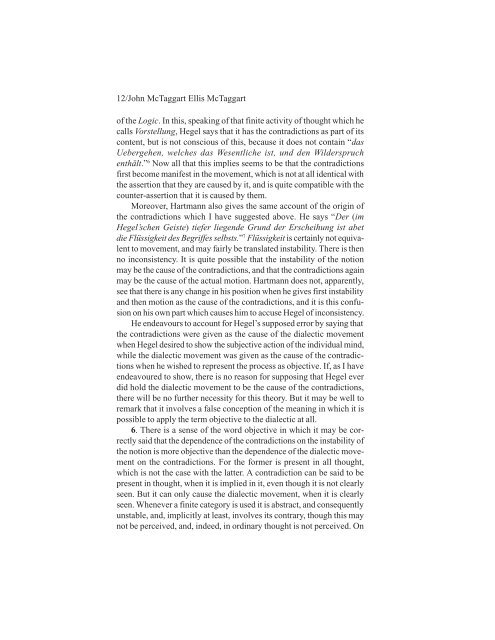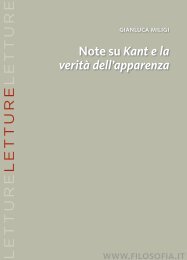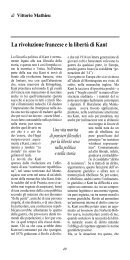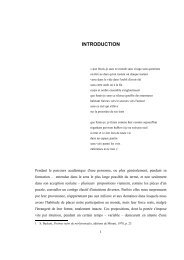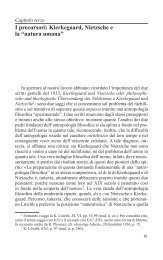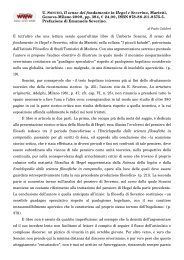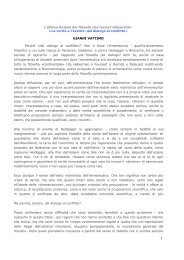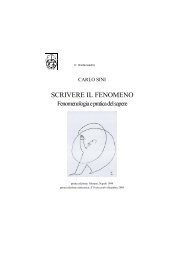McTaggart, Studies in the Hegelian Dialectic
McTaggart, Studies in the Hegelian Dialectic
McTaggart, Studies in the Hegelian Dialectic
You also want an ePaper? Increase the reach of your titles
YUMPU automatically turns print PDFs into web optimized ePapers that Google loves.
12/John <strong>McTaggart</strong> Ellis <strong>McTaggart</strong><br />
of <strong>the</strong> Logic. In this, speak<strong>in</strong>g of that f<strong>in</strong>ite activity of thought which he<br />
calls Vorstellung, Hegel says that it has <strong>the</strong> contradictions as part of its<br />
content, but is not conscious of this, because it does not conta<strong>in</strong> “das<br />
Uebergehen, welches das Wesentliche ist, und den Wilderspruch<br />
enthält.” 6 Now all that this implies seems to be that <strong>the</strong> contradictions<br />
first become manifest <strong>in</strong> <strong>the</strong> movement, which is not at all identical with<br />
<strong>the</strong> assertion that <strong>the</strong>y are caused by it, and is quite compatible with <strong>the</strong><br />
counter-assertion that it is caused by <strong>the</strong>m.<br />
Moreover, Hartmann also gives <strong>the</strong> same account of <strong>the</strong> orig<strong>in</strong> of<br />
<strong>the</strong> contradictions which I have suggested above. He says “Der (im<br />
Hegel’schen Geiste) tiefer liegende Grund der Erscheihung ist abet<br />
die Flüssigkeit des Begriffes selbsts.” 7 Flüssigkeit is certa<strong>in</strong>ly not equivalent<br />
to movement, and may fairly be translated <strong>in</strong>stability. There is <strong>the</strong>n<br />
no <strong>in</strong>consistency. It is quite possible that <strong>the</strong> <strong>in</strong>stability of <strong>the</strong> notion<br />
may be <strong>the</strong> cause of <strong>the</strong> contradictions, and that <strong>the</strong> contradictions aga<strong>in</strong><br />
may be <strong>the</strong> cause of <strong>the</strong> actual motion. Hartmann does not, apparently,<br />
see that <strong>the</strong>re is any change <strong>in</strong> his position when he gives first <strong>in</strong>stability<br />
and <strong>the</strong>n motion as <strong>the</strong> cause of <strong>the</strong> contradictions, and it is this confusion<br />
on his own part which causes him to accuse Hegel of <strong>in</strong>consistency.<br />
He endeavours to account for Hegel’s supposed error by say<strong>in</strong>g that<br />
<strong>the</strong> contradictions were given as <strong>the</strong> cause of <strong>the</strong> dialectic movement<br />
when Hegel desired to show <strong>the</strong> subjective action of <strong>the</strong> <strong>in</strong>dividual m<strong>in</strong>d,<br />
while <strong>the</strong> dialectic movement was given as <strong>the</strong> cause of <strong>the</strong> contradictions<br />
when he wished to represent <strong>the</strong> process as objective. If, as I have<br />
endeavoured to show, <strong>the</strong>re is no reason for suppos<strong>in</strong>g that Hegel ever<br />
did hold <strong>the</strong> dialectic movement to be <strong>the</strong> cause of <strong>the</strong> contradictions,<br />
<strong>the</strong>re will be no fur<strong>the</strong>r necessity for this <strong>the</strong>ory. But it may be well to<br />
remark that it <strong>in</strong>volves a false conception of <strong>the</strong> mean<strong>in</strong>g <strong>in</strong> which it is<br />
possible to apply <strong>the</strong> term objective to <strong>the</strong> dialectic at all.<br />
6. There is a sense of <strong>the</strong> word objective <strong>in</strong> which it may be correctly<br />
said that <strong>the</strong> dependence of <strong>the</strong> contradictions on <strong>the</strong> <strong>in</strong>stability of<br />
<strong>the</strong> notion is more objective than <strong>the</strong> dependence of <strong>the</strong> dialectic movement<br />
on <strong>the</strong> contradictions. For <strong>the</strong> former is present <strong>in</strong> all thought,<br />
which is not <strong>the</strong> case with <strong>the</strong> latter. A contradiction can be said to be<br />
present <strong>in</strong> thought, when it is implied <strong>in</strong> it, even though it is not clearly<br />
seen. But it can only cause <strong>the</strong> dialectic movement, when it is clearly<br />
seen. Whenever a f<strong>in</strong>ite category is used it is abstract, and consequently<br />
unstable, and, implicitly at least, <strong>in</strong>volves its contrary, though this may<br />
not be perceived, and, <strong>in</strong>deed, <strong>in</strong> ord<strong>in</strong>ary thought is not perceived. On


